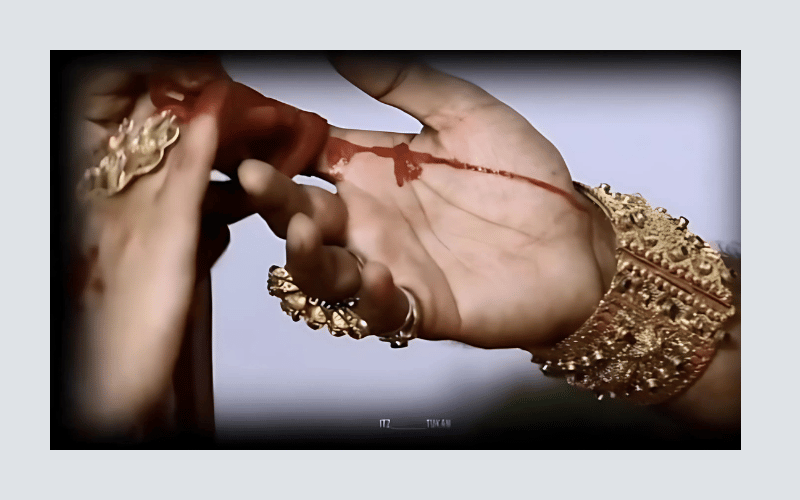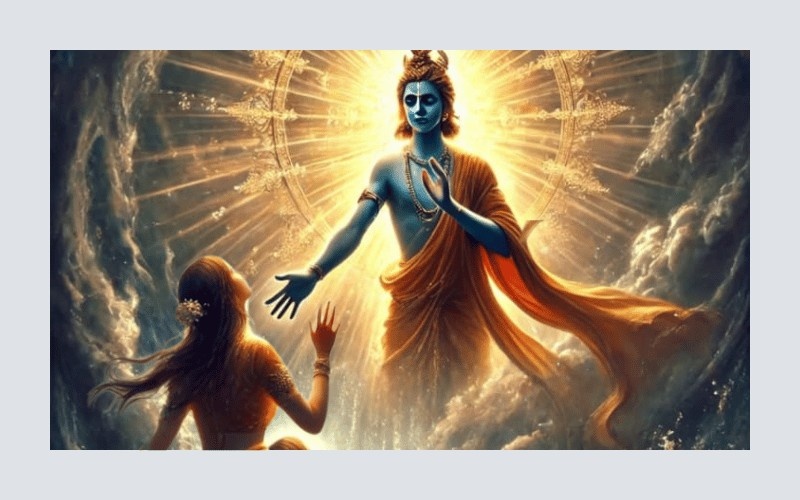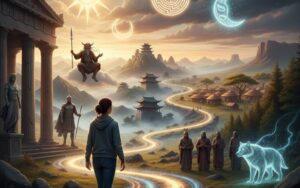Introduction: Reimagining the Mahabharata Through Her Eyes
The Mahabharata stands as a narrative of royals and fighting men, along with heavenly powers, with male figures leading most of the central events. Draupadi stands as a fire-born princess at the center of the epic because her life became entwined with every essential pivotal moment. Draupadi’s charismatic nature merged maternal tenderness with an unyielding spirit and an insightful mind, and embodied qualities that defied female stereotypes of that time. Her voice gets transmitted through the interpretations of men who surround her during the story.
Draupadi needs to be her epic as central character to unravel the true nature of her narrative. Suppose the extraordinary circumstances faced by Draupadi, along with her ideas and emotional state, created the framework of this story. A new retelling would not simply transform perspectives because it would create an elevated story that asserts female power by challenging basic ethical concepts, along with political authority and social fairness.
The Divine Feminine: Draupadi as Shakti Incarnate
Bhagavata Purana, together with Devdutt Pattanai, along with Sri Aurobindo, establishes that Draupadi was not just an ordinary queen but Shakti manifested within human form as divine feminine energy. Through her flames emerging from the sacred yajna ceremony, Draupadi manifests cosmic justice, which embodies the female power of Shakti. Draupadi emerged with an earthly purpose to combat the ethical injustices that surrounded her while distributing divine justice and acting as an instrument of divine power.
In this life Draupadi fulfilled her karmic responsibility from her past existence as Nalayani by marrying five men who become spiritual representations of earth, water and fire qualities and wind energy and conceptual space.
The epic would have Draupadi as the fundamental force of dharma standing as its unifying theme while uniting mystic elements with societal and political awareness.
Beyond the Dice Game: A Woman Wronged by Systemic Injustice
The narrative about the dice game from the Sabha Parva has established itself as one of the most disputed subjects regarding ethical conduct. Draupadi asks a more than ordinary question when she asks, “Which came first for you to lose: your identity or me?”. This becomes a fundamental disruption of philosophical thought. She caused the male elders representing both wisdom and war to become speechless. Bhishma, along with Vidura, proved incapable of delivering an answer that satisfied the reader.
Such a courtroom scene would transform into a direct assessment of societal structures that let women become property that anyone can gamble with and humiliate with no repercussions. A first-person narrative would incorporate her psychological suffering, together with the intense betrayal from her husband, along with her isolation in a patriarchal society.
Primarily her preservation becomes possible because of her steadfastness to maintain her dignity beyond the miracle of unfading material from Krishna. She did not beg. She questioned. She resisted.
Polyandry and Agency: A Marriage Not of Her Choosing
Popular reinterpretations dodge discussing the issue of how willing Draupadi was to become the wife of five men. Kunti took the leadership role in choosing the Pandavas to share one wife according to theological principles and karmic beliefs, and the Pandavas followed her decision. Draupadi, however, had no say. The depiction of her devotion to her husband takes center stage, but readers rarely investigate her hidden battles to balance emotions with jealousy alongside political and power struggles in this intricate marital arrangement.
Draupadi would explore their treatment of her because Yudhishthira treated her with detachment, Arjuna with romantic inclination, and Bhima exhibited protective instincts, Nakula and Sahadeva treated her with reverence. These interpersonal relationships across Draupadi’s husbands would generate multi-dimensional narratives that probe female solidarity and women’s emotional work and personal authenticity.
The Other Side of War: Draupadi as a Mother and Mourner
Draupadi suffered the loss of her five Upapandava sons, whom Ashwatthama murdered during their sleep after the war. The massive Kurukshetra war tends to steal attention from Ashwatthama’s horrific act of killing all five of Draupadi’s sons. The loss of her five Upapandava sons in their sleep made Draupadi experience the ultimate personal downfall of her life.
If Draupadi penned an epic, she would focus on the intense loss that gripped her heart as a mother. The epic would examine the military expenses alongside the defeated victory states while investigating if righteous conduct became too expensive at this point.
Her power was twofold; she used it to start war, and she endured what was worse than anything she could have imagined. A mother continued walking ahead as she kept silent and sorrowful after enduring unbearable tragedies.
Her Relationship with Krishna: Friendship Beyond Norms
Krishna declared Draupadi his “Sakhi” at the same time that she addressed him with the honorific “Sakha.” The fundamental connection between them expressed equal aspects of spiritual communion and unquestionable trust. The cosmic strategist named Krishna established a connection with human anchor Draupadi, which managed to rise above all social categories, such as human and cast, and political distinctions.
The friendship operated as a guiding force within the Draupadi epic by providing blending comfort with inner strength together with refined philosophical teachings during her intense struggles. The reason Krishna stopped the horrific moment was not because Draupadi was passive but because she remained strong in her right path while standing by herself. The deity acted through friendship that protected her justice instead of dispensing divine help to his believers.

Draupadi and Other Women of the Epic: A Sisterhood of Strength
The Mahabharata presents five female characters who maintain strong life stories, yet the writers did not fully explore their development. The narratives between Draupadi and her female friends would enrich and expand the already powerful story of her epic.
For example:
Their relationship would develop as an unpleasant bond that displays control and distant feelings, along with sacrifices.
Gandhari might identify with the wartime experiences of women who stay quiet despite their suffering.
Two important relationships could develop between Draupadi and both her maternal cousin, Subhadra, and her in-law, Uttara.
During her exile, Draupadi meets Queen Sudeshna, who reveals how women from different societal levels interact even in challenging circumstances.
The narrative of Draupadi demonstrates how a silent sorority remains unacknowledged within traditional male-focused stories through her social interactions.
The Climb to Salvation: Draupadi’s Last Journey
Among the Pandavas ascending the Himalayas for liberation Draupadi becomes the first to fail during their journey towards enlightenment. According to Yudhishthira the greatest crime of Draupadi lay in her preference for her husband Arjuna. In a Draupadi tale this historical scene takes on new meaning through an understanding of her tiredness which stemmed from enduring every sacrifice and hardship in her life.
Her fall isn’t tragic. It isreleasede. It is freedom. The narrative finishes with a transcendent conclusion instead of imposing judgment on her character.
Conclusion: Draupadi’s Mahabharata Is Also Ours
The story of Draupadi would present itself as a radical standpoint beyond alternations of the Mahabharata rather than a parallel version. It would be a reckoning. The proposed narrative paints a detailed picture of dignity while supporting the feminine voice.
The epic created by Draupadi would not belong to one particular period because the narrative would remind readers of their struggles with structural oppression in both the past and present. Draupadi’s story is eternal. By listening attentively, we can detect this message being developed through every audacious query regarding the definition of dharma and who establishes such rules.
Epilogue: Draupadi’s Legacy in Contemporary Consciousness
Draupadi’s story extends through time to present itself in modern settings where women fight for justice in courts while those who oppose abuse speak out and every person chooses not to let injustice suppress their voices. The story of her life today would track the fighting that female individuals face in patriarchal structures through multiple forms of struggle across global societies.
Her powerful resistance creates both inspirational value along systematic power analysis tools. Draupadi exists beyond mythic origins in modern literary studies because she represents deep personal force (agni) and justifiable rage (krodha) as well as fearless personal integrity. Today, Draupadi serves as a symbol of feminist analysis both in Mahasweta Devi’s stage production and Urshla Krieger’s written work, The Palace of Illusions.
Modern Draupadi would appear as a defender of justice who uses her skills as an attorney or journalist or as an activist, or whistleblower to oppose systems of oppression without hesitation. The lady would not depend on anyone else to come save her, but instead would organize reforms herself. The character would transcend symbolic strength because she would incarnate it.
Draupadi’s narrative pushes past the common two-dimensional women’s roles in traditional society between good and bad or obedient and rebellious. As both queen and victim, she demonstrates able strategic prowess at the same time she shows utter suffering capability while keeping a deeply spiritual yet brutally truthful attitude. Her complexity is her power. Her contradictions are her strength.
Writing a new version of her epic goes beyond mere literary adaptation. It is a cultural necessity. Through the tale of the mistreated Draupadi we must question how justice would appear when its narrative stems from the perspective of the victimized. Does understanding the Mahabharata epic depend on hearing every voice and particularly those who experienced the most silence?
The creation of an epic about Draupadi does not modify history but rather helps to complete its full narrative.














